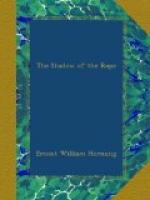Rachel remembered the Swiss maid’s remark about the loss of her clothes and the number of persons who had fared so much worse and lost their lives. But Steel’s last words dismissed every thought but that of their own import. And in an instant she was trembling upright in the easy-chair.
“You believed me!” she whispered. “You believed me at the time!”
And for nothing had he earned such gratitude yet; her moist eyes saw the old-fashioned courtesy of his bow in answer, but not the subtlety of the smile that bore it company in the depths of the dark eyes: it was a smile that did not extend to the short, tight mouth.
“What is more to the point, my dear lady,” he went on in words, “the jury believed you, and I saw that they did. You made a tremendous impression upon them. The lawyer against you was too humane to try very hard to remove it, and the judge too just—though your own man did his best. But I saw at once that it would never be removed. It was between you and the jury—human being to human beings—and no third legal party intervening. That was where you scored; you went straight as a die to those twelve simple hearts. And I saw what you had done—what the lawyers between them could not undo—and took immediate measures.”
Rachel looked up with parted lips, only to shut them firmly without a word.
“And who was I to take measures on your behalf?” queried Steel, putting the question for her. “What right or excuse had I to mix myself up in your affairs? I will tell you, for this morning is not last night, and at least you have one good night’s rest between you and the past. My dear Mrs. Minchin, I had absolutely no right at all; but I had the excuse which every man has who sees a woman left to stand alone against the world, and who thrusts himself, no matter how officiously, into the breach beside her. And then for a week I had seen you all day and every day, upon your trial!”
At last there something with a ring of definite insincerity, something that Rachel could take up; and she gazed upon her self-appointed champion with candid eyes.
“Do you mean to say that you never saw me before—my trouble, Mr. Steel?”
“Never in my life, my dear lady.”
“Then you knew something about me or mine!”
“What one read in the newspapers—neither more nor less—upon my most solemn word—if that will satisfy you.”
And it did; for if there had been palpable insincerity in his previous protestations, there was sincerity of a still more obvious order in Mr. Steel’s downright assurances on these two points. He had never ever seen her before. He knew nothing whatever about her up to the period of notoriety; he had no special and no previous knowledge of his own. It might not be true, of course; but there was that in the deep-set eyes which convinced Rachel once and for all. There was a sudden light in them, a light as candid as that which happened to be shining in her own, but a not too kindly one, rather a glint of genuine resentment. It was his smooth protestations that Rachel distrusted and disliked. If she could ruffle him, she might get at the real man; and with her questions she appeared to have done so already.




